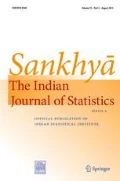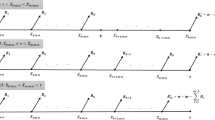Abstract
In this paper, the problem of estimation of the parameters for the GIED based on progressive Type-I censoring scheme in the presence of competing risks model will be considered under Bayesian and non-Bayesian approaches. In this regards, the MLEs, asymptotic confidence intervals and bootstrap confidence interval for the unknown parameters are obtained. The relative risks due to each cause of failure are investigated, where two independent causes of failure are assumed. Also, Bayes estimates and associated HPD credible interval estimates are computed using MCMC by utilizing Metropolis-Hasting algorithm under squared error loss function. A Monte Carlo simulation study will be conducted to compare the performance of the various proposed estimators. Finally, analysis of a real data set is used to illustrate the theoretical results of relative risk, MLE estimates and Bayes estimates at selected schemes of progressively Type-I censored samples under causes of failure follow the assumed distributions.



Similar content being viewed by others
References
Abouammoh, A.M. and Alshingiti, A.M. (2009). Reliability estimation of generalized inverted exponential distribution. J. Stat. Comput. Simul. 79, 1301–1315.
Ashour, S.K. and Nassar, M.M.A. (2014). Analysis of exponential distribution under adaptive type-I progressive hybrid censored competing risks data. Pakistan J. Stat. Oper. Res. Research 10, 229–245.
Balakrishnan, N. and Cramer, E. (2010). The Art of Progressive Censoring: Applications to Reliability and Quality. Springer, Berlin.
Balakrishnan, N., Han, D. and Iliopoulos, G. (2011). Exact inference for progressively type-I censored exponential failure data. Metrika 73, 335–358.
Balasooriya, U. and Low, C.K. (2004). Competing causes of failure and reliability tests for Weibull lifetimes under type I progressive censoring. IEEE Trans. Reliab. 53, 29–36.
Chen, M.H. and Shao, Q.M. (1999). Monte Carlo estimation of Bayesian credible and HPD intervals. J. Comput. Graph. Stat. 8, 69–92.
Cohen, A.C. (1965). Maximum likelihood estimation in the Weibull distribution based on complete and censored samples. Technometrics 5, 327–329.
Crowder, M. J. (2001). Classical Competing Risks. Chapman & Hall/CRC, Boca Raton.
Dey, S. (2007). Inverted exponential distribution as a life distribution model from a Bayesian viewpoint. Data Sci. J., 6, 107–113.
Dey, S. and Dey, T. (2013). Generalized inverted exponential distribution: Different methods of estimation. Am. J. Math. Manag. Sci. 33, 194–215.
Dey, S. and Dey, T. (2014a). On progressively censored generalized inverted exponential distribution. J. Appl. Stat. 41, 2557–2576.
Dey, S. and Pradhan, B. (2014b). Generalized inverted exponential distribution under hybrid censoring. Stat. Methodol. 18, 101–114.
Dey, S., Dey, T. and Luckett, D.J. (2016a). Statistical inference for the generalized inverted exponential distribution based on upper record values. Math. Comput. Simul. 120, 64–78.
Dey, S., Singh, S., Tripathi, Y.M. and Asgharzadeh, A. (2016b). Estimation and prediction for a progressively censored generalized inverted exponential distribution. Stat. Methodol. 132, 185–202.
Dube, M., Krishna, H. and Garg, R. (2016). Generalized inverted exponential distribution under progressive first-failure censoring. J. Stat. Comput. Simul. 86, 1095–1114.
Herman, R. J. and Patell, K.N.R. (1971). Maximum likelihood estimation for multi-risk model. Technometrics 13, 385–396.
Hoel, D.G. (1972). A representation of mortality data by competing risks. Biometrics 28, 475–488.
Krishna, H. and Kumar, K. (2013). Reliability estimation in generalized inverted exponential distribution with progressively type II censored sample. J. Stat. Comput. Simul. 83, 1007–1019.
Lin, C.T., Duran, B.S. and Lewis, T.O. (1989). Inverted gamma as life distribution. Microelectron. Reliab., 29, 619–626.
Mahmoud, M.R., Muhammed, H.Z. and El-Saeed, A.R. (2020). Analysis of progressively Type-I censored data in competing risks models with generalized inverted exponential distribution. J. Stat. Appl. Probab. 9, 109–117.
Moeschberger, M.L. and David, H.A. (1971). Life tests under competing causes of failure and the theory of competing risks. Biometrics 27, 909–933.
Ravenzwaaij, D.V., Cassey, P. and Brown, S.D. (2018). A simple introduction to Markov Chain Monte–Carlo sampling. Psychon. Bull. Rev. 25, 143–154.
Singh, S.K., Singh, U., Yadav, A.S. and Vishwkarmaand, P.K. (2013). On the estimation of stress strength reliability parameter of inverted exponential distribution. Int. J. Sci. World 3, 98–112.
Singh, S., Tripathi, Y.M. and Jun, C.H. (2015). Sampling plans based on truncated life test for a generalized inverted exponential distribution. Ind. Eng. Manag. Syst. 14, 183–195.
Acknowledgments
The authors are grateful to the anonymous referee for a careful checking of the details and for helpful comments that improved this paper.
Author information
Authors and Affiliations
Corresponding author
Additional information
Publisher’s Note
Springer Nature remains neutral with regard to jurisdictional claims in published maps and institutional affiliations.
Rights and permissions
About this article
Cite this article
Mahmoud, M.R., Muhammed, H.Z. & El-Saeed, A.R. Inference for Generalized Inverted Exponential Distribution Under Progressive Type-I Censoring Scheme in Presence of Competing Risks Model. Sankhya A 85, 43–76 (2023). https://doi.org/10.1007/s13171-020-00227-y
Received:
Accepted:
Published:
Issue Date:
DOI: https://doi.org/10.1007/s13171-020-00227-y
Keywords
- Generalized inverted exponential distribution
- Progressive Type-I censoring scheme
- Competing risks model
- Maximum likelihood estimation
- Bayesian estimation
- Markov Chain Monte Carlo.




